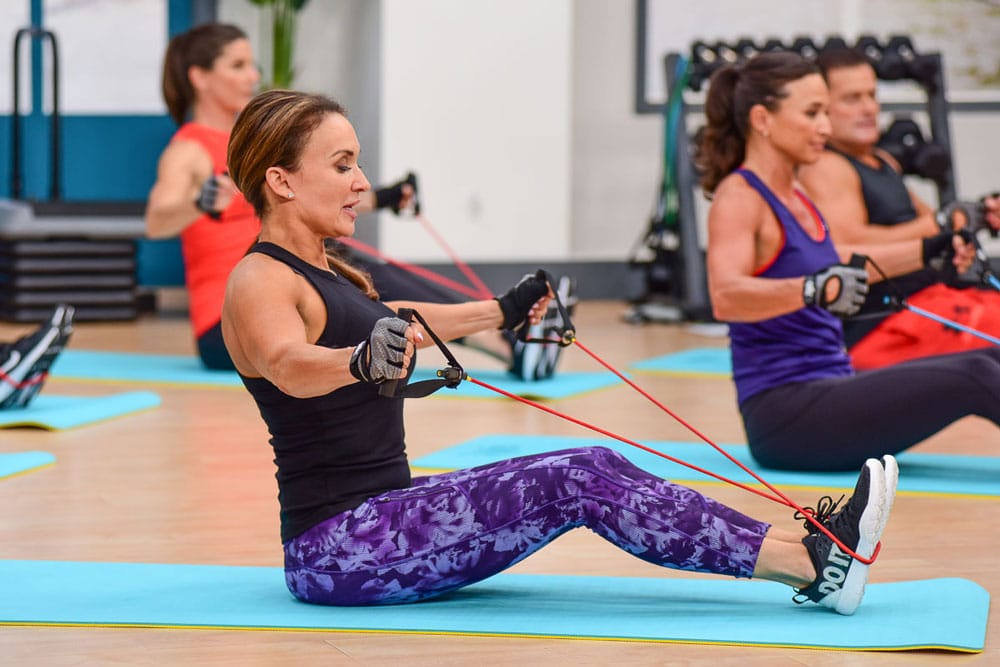Have you ever focused so on working the front-facing muscles, like your biceps and abs, that you neglected the muscles that run down the back of your body? These muscles are collectively called the posterior chain and they’re super important for healthy movement patterns, strength, and for preventing injury. When these muscles don’t get enough activation, they get weaker and more prone to injury.
But there’s another reason your posterior chain is weak. It has to do with lifestyle! Specifically, sitting too much causes these muscles to be out of balance with the muscles in the front of your body, the anterior chain. If you work in an office or at a desk, even if you do regular workouts, you can suffer from the effects of “sittingitis,” too much time in a chair and your posterior chain is feeling the brunt of it.
What Are the Muscles That Make Up the Posterior Chain?
The posterior chain, a powerhouse of muscles, forms a dynamic network from the lower back down to the glutes and hamstrings. Imagine a strong, interconnected chain supporting and stabilizing your body when you carry out your daily activities.
At its core lies the erector spinae, a group of muscles running alongside your spine. These muscles help you maintain an upright posture and provide crucial back support during activities like standing or lifting. These muscles support your spine and help you stay upright.
Now, let’s move further down. Below the spine, you’ll find the all-important glute muscles – the gluteus maximus, medius, and minimus. The gluteus maximus, the largest of the three, powers hip extension and outward rotation. When you stand up from a seat, climb stairs, or explode in jumps and sprints, it’s in action. On the sides of the hip, the gluteus medius and minimus stabilize the pelvis during single-leg or lateral movements.
Now, let’s move to the hamstrings, a trio of muscles: the biceps femoris, semitendinosus, and semimembranosus. These powerful muscles flex the knee and extend the hip, enabling walking, running, and knee-bending. They also control deceleration during activities like running or executing lower body exercises such as deadlifts.
Together, these muscles form a cohesive unit. They work together to give you a backside of steel, along with stability and the ability to move safely and with a lower risk of injury. They work in harmony, whether you’re doing everyday tasks or intense physical activities, facilitating bending, lifting, and propelling yourself through life with ease.
How Sitting Weakens Your Posterior Chain
Unfortunately, the inactive lifestyle of today causes these muscles to weaken. When you sit for a long period, the muscles in your posterior chain relax too. Your anterior chain muscles also shrink and stiffen. This imbalance can lead to muscle imbalances, weakness, tight hip flexors, and poor posture and posterior chain.
Another reason for a weak posterior chain is not focusing on these muscles enough when you train. You might work the vanity muscles, the ones you see when you look in the mirror (the anterior chain) harder, thereby worsening the imbalance.
Correcting a Weak Posterior Chain
The first priority for correcting a weak posterior chain is to break up periods of sitting. Rather than staying planted in a chair for hours, get up every 30 minutes and stretch and walk around. If you feel funny stretching at your desk, take a bathroom break and do some stretches. Strolls around the office help too, as they force your slumbering muscles to activate.
Next, add more exercises to your routine that target the posterior chain. Some of the best posterior chain exercises include deadlifts, squats, lunges, glute bridges, and back extensions. Deadlifts are a fantastic exercise for engaging your posterior chain since it’s a whole-body exercise.
Think beyond the standard deadlift to deadlift variations. The Romanian deadlift is a deadlift variation that targets your glutes and hamstrings with precision. Don’t forget about the single-leg Romanian deadlift, an exercise that works your glutes, hamstrings, and lower back on one side. It’s an effective exercise for correcting posterior chain strength imbalances, where one side is stronger than the other.
Don’t forget about pull-ups and rows for working the muscles in your upper back, including the rhomboids, trapezius, and lats. For strengthening your hamstrings, try glute ham raises and hamstring curls.
Correct Bad Posture
Get back to basics by using proper posture, rather than slouching when you sit or stand. When you use good posture, you engage the muscles in your posterior chain more than when you slouch.
You may also benefit from using a standing desk. With a standing desk, you can change positions more easily to reduce stress on your joints and muscles. Plus, when you stand, you can move around more during the day and avoid the perils of too much sitting.
What Are the Benefits of a Stronger Posterior Chain?
One reason to strengthen your posterior chain is to create more balanced strength between your anterior and posterior chain. But there’s more. Strengthening the muscles in your posterior chain will help you correct weak neck and back muscles that cause neck and back pain. Plus, it helps counter rounded shoulders and forward head posture that are so common.
You’ll also get performance enhancements when you play sports. Whether you run, jump, or lift weights, you’ll be able to generate more speed and explosive power if you have posterior chain strength.
Conclusion
Focusing more on your posterior chain can unleash a world of fitness benefits. Celebrate the extra power your body will generate during explosive movements when you strengthen your posterior chain. You’ll also boost your athletic prowess and dominate when you play sports. So next time you hit the gym, don’t forget to incorporate exercises that target your backside, such as deadlifts, hip thrusts, and back extensions. Your body will thank you in the long run!
References:
- De Ridder EM, Van Oosterwijck JO, Vleeming A, Vanderstraeten GG, Danneels LA. Posterior muscle chain activity during various extension exercises: an observational study. BMC Musculoskelet Disord. 2013 Jul 9;14:204. doi: 10.1186/1471-2474-14-204. PMID: 23834759; PMCID: PMC3716991.
- McAllister MJ, Hammond KG, Schilling BK, Ferreria LC, Reed JP, Weiss LW. Muscle activation during various hamstring exercises. J Strength Cond Res. 2014 Jun;28(6):1573-80. doi: 10.1519/JSC.0000000000000302. PMID: 24149748.
- Cuthbert, Matthew1,2; Ripley, Nicholas J.1; Suchomel, Timothy J.1,3; Alejo, Robert4; McMahon, John J.1; Comfort, Paul1,5,6. Electromyographical Differences Between the Hyperextension and Reverse-Hyperextension. Journal of Strength and Conditioning Research 35(6):p 1477-1483, June 2021. | DOI: 10.1519/JSC.0000000000004049.
Related Articles By Cathe:
Improve Your Strength-Training Performance with These 5 Effective Posterior Chain Exercises
5 Exercises to Build a Strong Posterior Chain
Strength Training: Why You Need to Focus More on Your Posterior Chain
Hunched Shoulders – What Causes Them and How to Correct Them?
4 Factors That Boost the Risk of Hamstring Injuries
What Are the Best Exercises to Boost Flat Buttocks?
The 3 Most Common Posture Problems and How They Jeopardize Your Health
3 Common Posture Problems and Ways to Correct Them with Exercise
Related Cathe Friedrich Workout DVDs:
STS 2.0 Muscle & Recovery Workout Program
STS Strength 90-Day Workout Program


